Pro-Saudi X accounts repeatedly harassed activist and fiancée of murdered journalist Jamal Khashoggi
Turkish activist Hatice Cengiz, fiancée of murdered Saudi journalist Jamal Khashoggi, targeted with death threats and insults on the platform formerly known as Twitter
Pro-Saudi X accounts repeatedly harassed activist and fiancée of murdered journalist Jamal Khashoggi
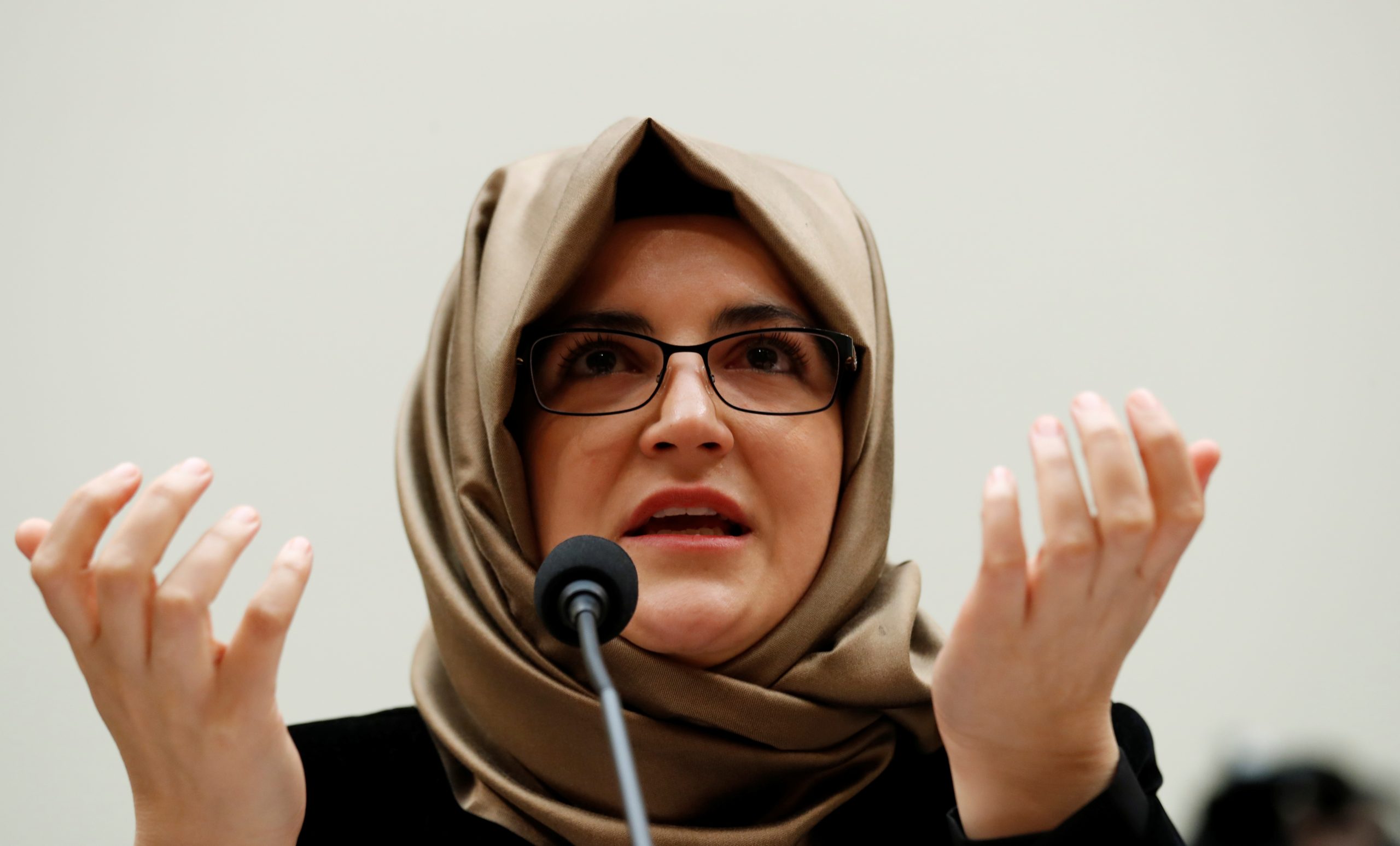
BANNER: Hatice Cengiz, fiancée of murdered journalist Jamal Khashoggi, testifies before a House Foreign Affairs Subcommittee hearing on “The Dangers of Reporting on Human Rights” in Washington DC, May 16, 2019. (Source: Reuters/Kevin Lamarque)
More than five years after the murder of Saudi journalist and critic Jamal Khashoggi, pro-Saudi accounts on X continue to target his Turkish fiancée and fellow activist, Hatice Cengiz. A DFRLab analysis of replies to Cengiz’s tweets discussing Khashoggi or Saudi Arabia revealed insults, efforts to discredit her, and death threats over a multi-year period by at least one hundred highly-engaged accounts. The X accounts, many of which displayed indicators of coordination, often used misogynistic content to mock her appearance and frame her as an untrustworthy person exploiting Khashoggi’s murder for personal gain.
X, formerly known as Twitter, is the most visited social media platform in Saudi Arabia, according to market research platform SimilarWeb. Saudi Arabia is also a major investor in X, with Prince Alwaleed bin Talal and his Kingdom Holding Company controlling nearly 35 million shares at the time of Elon Musk’s acquisition of the company in 2022.
The Saudi government has targeted Saudi X users for expressions of dissent, handing out severe prison sentences for tweets and retweets. In August 2023, the brother of Saudi academic and activist Saeed bin Nasser al-Ghamdi received a death sentence for authoring and sharing critical tweets to his ten Twitter followers. According to a September 2023 article by The Guardian, X has also been accused of allowing Saudi Arabia to “commit grave human rights abuses against its users” after Amnesty International documented evidence alleging how former Saudi Twitter employees unlawfully helping the regime government identify anonymous Twitter users.
The October 2018 killing of Khashoggi inside the Saudi consulate in Istanbul resulted in international condemnation that blamed the Kingdom of Saudi Arabia for what a United Nations expert report later described as “premediated extrajudicial execution.” Although Saudi Crown Prince Mohammed bin Salman, more commonly known by his initials MBS, has denied all accusations against him, the US Office of the Director of National Intelligence (ODNI) concluded in 2021 that MBS approved the assassination plan.
Despite advocacy efforts by Khashoggi’s fiancée, Hatice Cengiz, for an international criminal investigation and legal action against MBS and other Saudi officials, the results have been limited. As NPR noted in October 2023, only some of the accused have been put on trial, while a Turkish court transferred its own cases to a Saudi court. Moreover, after MBS became prime minister in 2022, the Biden administration determined that the crown prince’s promotion to Saudi head of government effectively immunized him in the case.
Those involved in bringing the case have also been the target of surveillance efforts. For instance, reporting by Amnesty International and the Washington Post revealed that both Cengiz and Hanan Elatr, Khashoggi’s widow, were targeted with Pegasus spyware and that Saudi Arabia planned to surveil Cengiz’s activities in London.
Professor Ahmed Al-Rawi of Simon Fraser University first highlighted the targeting of Cengiz on X in a 2021 study in which he examined a coordinated disinformation campaign to discredit Khashoggi. While Al-Rawi’s research focused on online discourse about Khashoggi from the time of his murder through 2021, it also documented Saudi X accounts attempting to discredit Cengiz during the same period. These accounts accused Cengiz of being a spy for Turkey or Qatar, and alleged that she had engaged an affair with Amazon founder Jeff Bezos, who also owns the Washington Post, where Khashoggi served as a columnist. Al-Rawi also noted the circulation of hateful sexist messages targeting Cengiz.
Building on this research, the DFRLab analyzed at-replies targeting Cengiz on X during the same period covered by Al-Rawi. Through this work, we uncovered at least three death threats sent to Cengiz in 2018. A further review of at-replies targeting Cengiz during 2022 and 2023 uncovered more threats, sexist attacks, and narratives aimed at discrediting her, including one narrative claiming that she was still married to her former husband and had lied about being Khashoggi’s fiancée.
Accounts attacking Cengiz exhibited multiple signs of suspicious behavior. Many utilized identical or similar images and insults in their at-replies to Cengiz, often posted during the same time span. They also used publicly available images for their account avatars, in some cases using the same images of MBS.
While the number of accounts involved may seem modest given the wide popularity of X in Saudi Arabia, they are particularly noteworthy given the fact they have attacked Cengiz over multiple years, employing misogynistic messaging and outright threats of violence.
X’s abuse and harassment policy includes a section on targeted harassment, which it defines as “multiple Posts, over a short period of time, or continuously posting replies with malicious content, to target an individual.” This is considered a breach of its policy, along with “severe, repetitive usage of insults or profanity where the context is to harass or intimidate others.”
Discrediting narratives
Pro-Saudi accounts used multiples narratives claiming that Cengiz could not have been Khashoggi’s fiancée, arguing that Khashoggi was still married to another woman at the time of his death, that Cengiz was still married to her former husband, and that she had engaged in affair with Amazon founder and Washington Post owner Jeff Bezos. These narratives all aimed at shaming Cengiz and portraying her as a dishonest person exploiting Khashoggi’s case for her own financial benefit and fame. Accounts used the same images and graphics to amplify these narratives, sometimes on the same day or during a short timespans; they also repeatedly targeted Cengiz with the same attacks.
Jeff Bezos expressed his support to Cengiz during a 2019 memorial service in Istanbul marking the first anniversary of Khashoggi’s death. Several months later in January 2020, a United Nations report claimed MBS was involved in a plot to hack Bezos’s phone prior to Khashoggi’s murder. Following the release of the report, former DFRLab researcher Ben Nimmo noted that Saudi accounts had amplified a trending hashtag calling for a boycott of Amazon, also owned by Bezos.
One prevailing narrative relied on a set of photos of Bezos with Cengiz at the Istanbul memorial service. When these pictures first emerged in 2019, CNN Arabia reported that some Saudi Twitter accounts considered them to be controversial, specifically photos that showed Bezos hugging Cengiz, arguing that it was inappropriate and that she was using the murder to get closer to powerful individuals such as Bezos.
The DFRLab’s analysis noted at least sixty-three instances in 2022 and 2023 of at-replies by more than forty accounts to Cengiz featuring the Bezos photos, and that the accounts posting the at-replies amplified claims of inappropriate behavior similar to those that emerged after the 2019 ceremony. Some accounts used sexually harassing language in their replies and suggested that the photos were evidence that she and Bezos were romantically involved with each other.
Replies to Cengiz’s posts showed indicators of potential coordination between the accounts targeting her. For instance, at least four different accounts used the same picture of Bezos and Cengiz hugging in February 2023, while at least seven different accounts used the same collage of different pictures of Bezos and Cengiz together during the 2019 memorial service. Multiple accounts used this collage of photos in replies to different tweets by Cengiz on November 3, 18, 19, and 21, 2022.
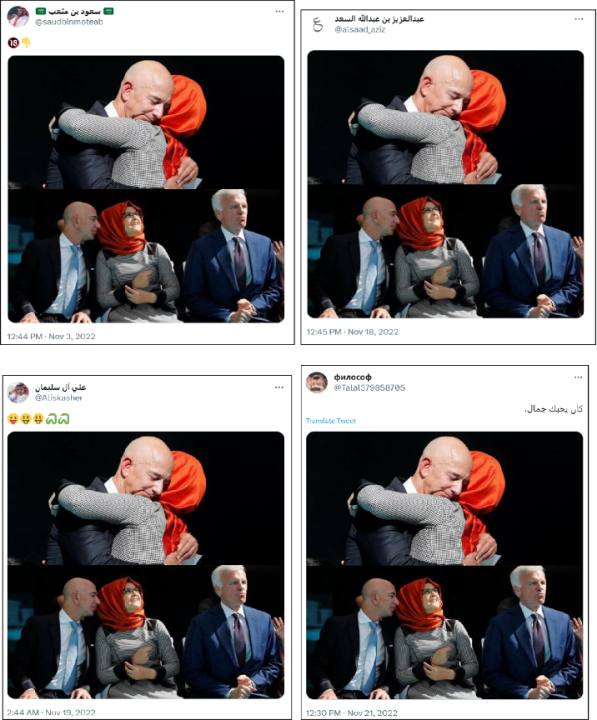
On November 18, 2022, at least four additional accounts shared a cartoon alleging without evidence that Cengiz was in a relationship with both Bezos and Khashoggi while being still married her previous husband.
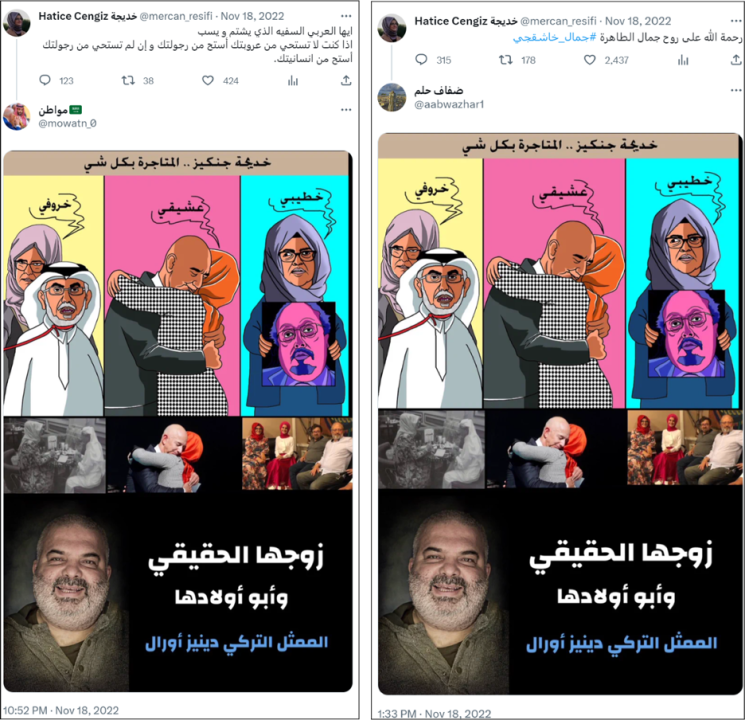
That same afternoon, multiple accounts replied to three different tweets by Cengiz, each targeting her with the same picture of her hugging Bezos.
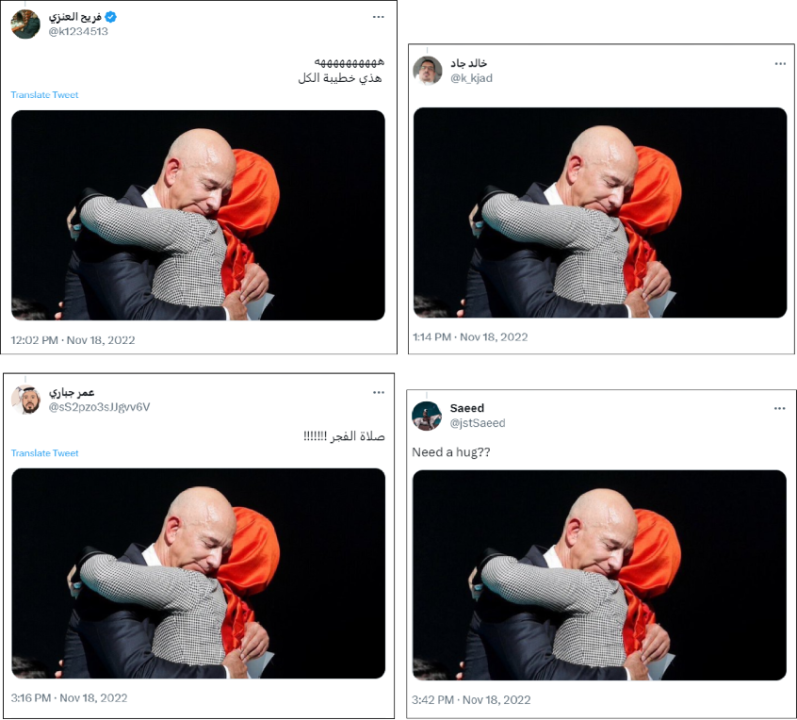
Accounts continued to reply to her tweets that evening with photos of her with Bezos. Two of these tweets occurred within five minutes of each other, at 7:02pm and 7:07pm local time, respectively. Nine minutes later, two other accounts replied to her with more Bezos photos at 7:16pm.
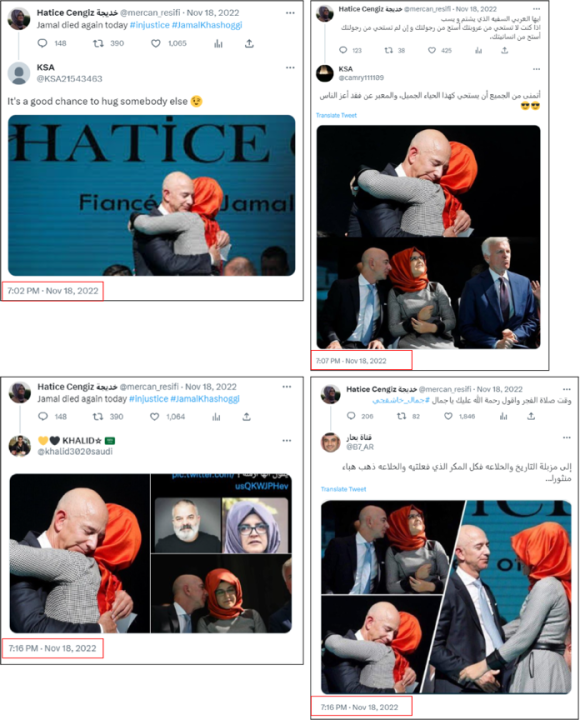
Other accounts published multiple replies to Cengiz using the same picture of her hugging Bezos. In one instance, the account @OleaOleaAlanzi engaged in this four times, while another account, @DrFMNazz , did the same at least fifteen times.
Sexist harassment, insults, and threats
Accounts also targeted Hatice Cengiz with misogynistic attacks. The DFRLab identified at least fifty-eight replies containing sexist insults and at least twenty-seven replies mocking her physical appearance. In many cases, the accounts targeted her tweets discussing Khashoggi’s death or his legacy, but others reponded to tweets unrelated to the murder. Among these replies, the DFRLab observed multiple accounts using the same image of a pot with a scarf and glasses in an attempt to ridicule her. One account tweeted the same picture least fifteen times in response to a single tweet. Others sent her similar insults and slurs in Arabic and English while accusing her of taking advantage of Khashoggi’s case for personal gain or fame.

When discussing Khashoggi’s murder, many accounts used similar or even identical replies to Cengiz wishing her the same violent fate. Several replies used the Arabic word عقبالك, which roughly translates to “wishing you the same,” and جعلك تلحقيه “May you join him.” These expressions would appeare when Cengiz tweeted about Khashoggi, as well as when she discussed the death of Emirati activist Alaa al-Siddiq, who died in a June 2021 car accident.

The DFRLab identified at least one hundred accounts targeting Cengiz. Many of the accounts replying to Cengiz maintained some level of anonymity by using generic profile images, such as random photos freely available online, nationalistic Saudi symbols such the Saudi flag or MBS, or by featuring no profile image at all. At least forty-six accounts used either generic photos of celebrities, athletes, animals, buildings, landmarks, and natural scenery, or did not use any photos. At least nine accounts used pictures of MBS.

The incessant repetition of rumors and misogynistic messages against Cengiz over a multi-year period suggests that this is an ongoing effort to damage her reputation and defame her character. It is likely intended to undermine her advocacy to seek justice for Khashoggi’s state-sanctioned murder, as well as to instill fear, especially given that the messages took the form of at-replies to Cengiz’s tweets.
Cengiz is not the first or only target; pro-Saudi accounts have frequently used Twitter and other social media platforms, such as Facebook, to harass Saudi and non-Saudi critics abroad, using troll accounts that launch similar smear campaigns and tactics against dissidents. Even though people of all genders face such attacks, these accounts often resort to different forms of gender-based threats and misogynistic content when targeting women. According to the Council of Europe, female politicians, journalists, gamers, bloggers, and public figures are particularly targeted by such online threats. This pattern is evident in the targeting of female journalists critical of Saudi Arabia, such as journalist Ghada Oueiss, who faced a smear campaign in 2020 on Twitter that used private stolen photos after her phone was hacked.
Cite this case study:
“Pro-Saudi X accounts repeatedly harassed activist and fiancée of murdered journalist Jamal Khashoggi,” Digital Forensic Research Lab (DFRLab), December 22, 2023, https://dfrlab.org/2023/12/22/pro-saudi-x-accounts-repeatedly-harassed-activist-and-fiancee-of-murdered-journalist-jamal-khashoggi/.

